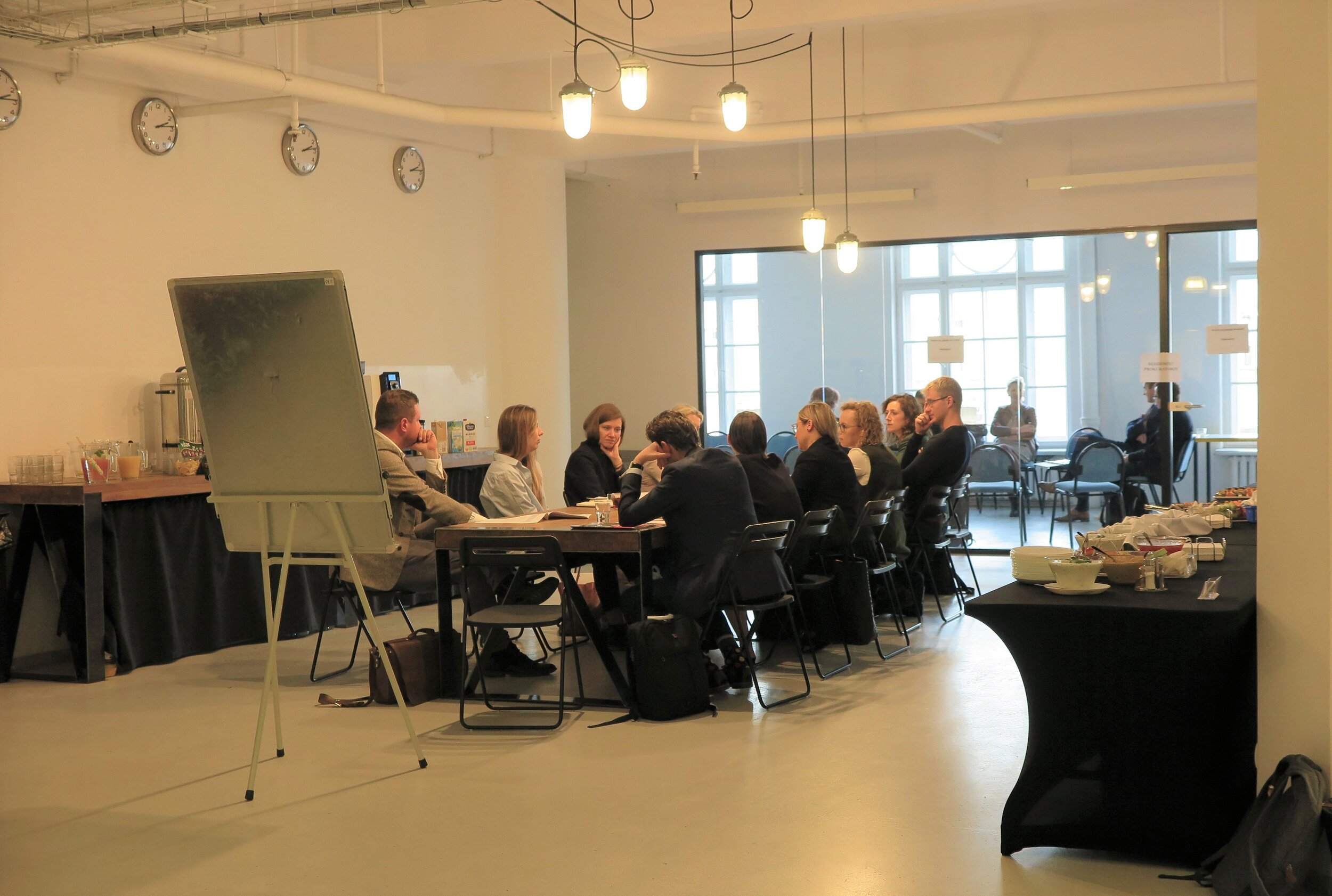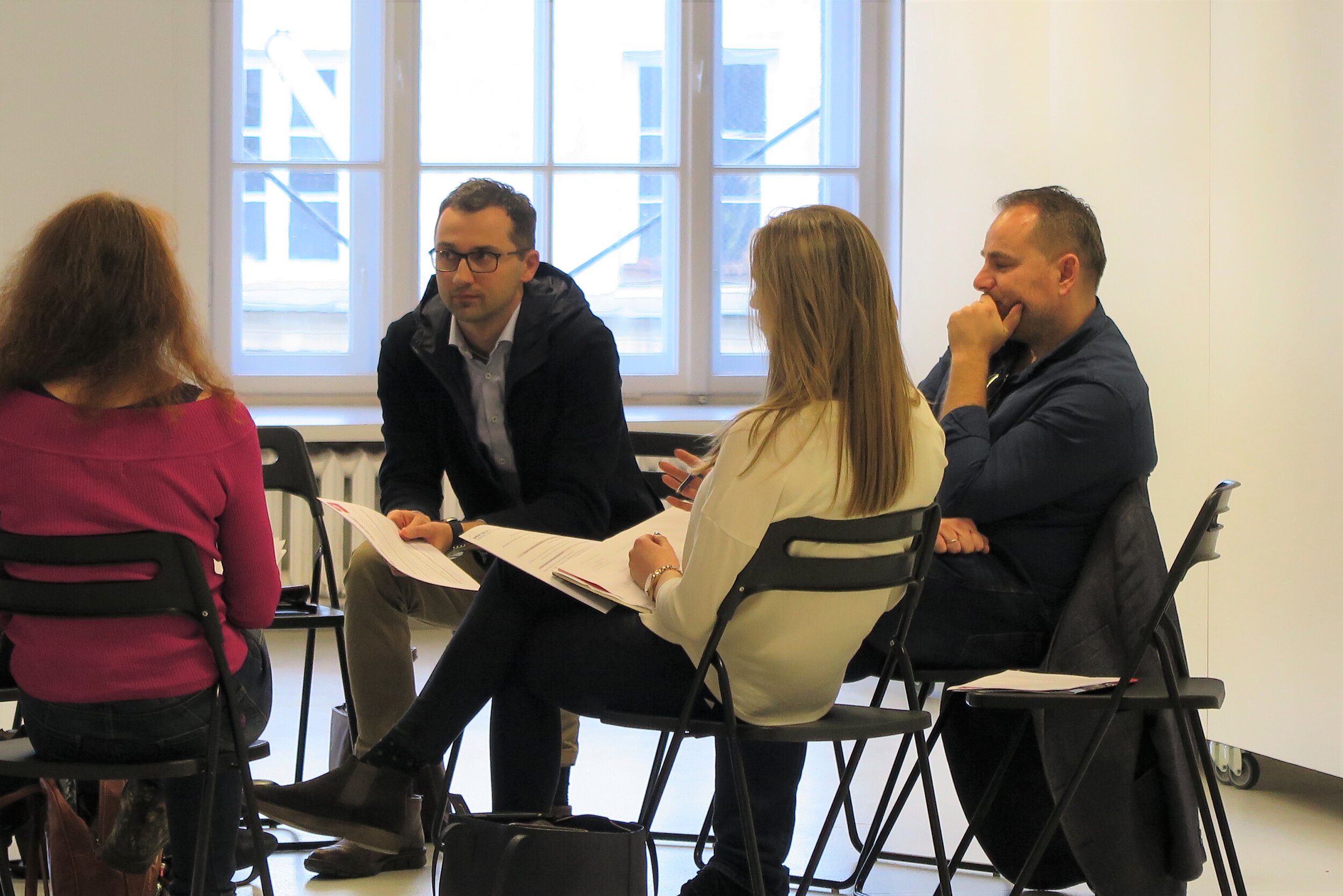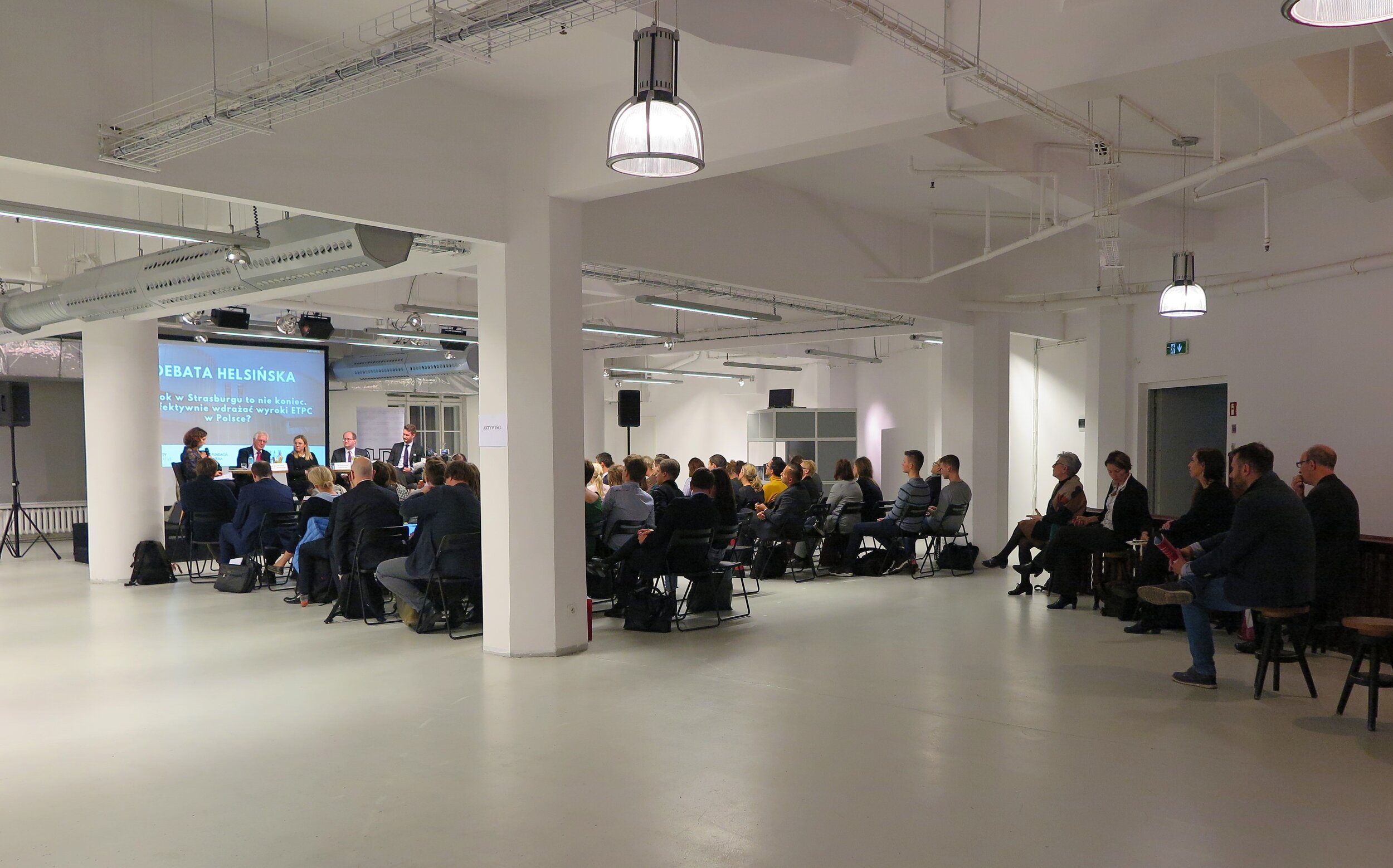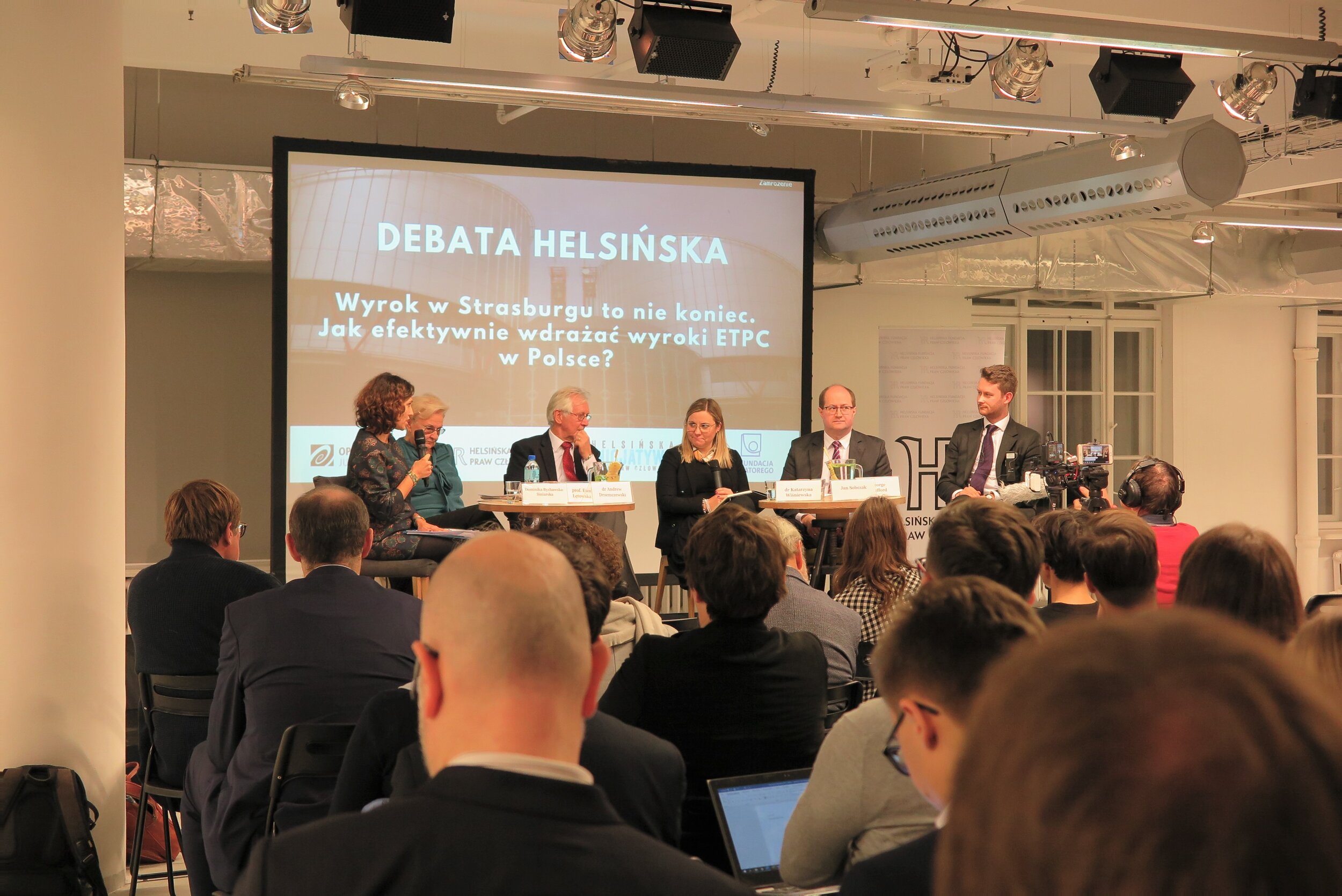Implementation of Strasbourg Court judgments: a shared responsibility
/How can a multi-stakeholder alliance promote the implementation of judgments in Poland? EIN partners with the Helsinki Foundation for Human Rights and the Open Society Justice Initiative to find answers
“A Strasbourg Court judgment is not the end!” was the title of a multi-stakeholder workshop held in Warsaw (Poland) on 5 November 2019. Winning a case before the European Court of Human Rights (ECtHR, ‘the Court’) might conclude a long process of litigation, but it will not automatically translate into justice for the victim, let alone improve the situation of others who are in a similar situation: the Court cannot strike down national laws that might result in the violation of human rights. It cannot single-handedly ensure that a person who is unlawfully detained is released from prison. The Court also does not have the power to change domestic judicial practice. It is the respondent state that must adopt measures to redress the victim of a human rights violation established by the Court, and ensure that the violation is not repeated.
Here is the good news: when the judgments of the ECtHR are properly implemented, they can lead to tangible human rights improvements on the ground. Take Wizerkaniuk v. Poland as an example, a freedom of expression case from 2011. Mr Wizerkaniuk was a newspaper editor. He was prosecuted and convicted to pay a fine for publishing a verbatim interview. There was no issue regarding the veracity of the article; the problem was that the interviewee had not given their authorisation.
This case was emblematic of a wider problem: journalists in Poland would be criminally charged and prosecuted for publishing quotes without prior authorisation, and the domestic courts would have no regard to whether the published statements corresponded to what had been said during the interview. This effectively gave interviewees a carte blanche to prevent a journalist from publishing any interview they regarded embarrassing or unflattering, regardless of how truthful or accurate it was. The chilling effect on freedom of expression was noticeable.
Mr Wizerkaniuk brought his case to the ECtHR and won. Subsequently, the Polish Press Act was amended. The obligation to obtain authorisation and the related procedure and time-limits were clarified. This means interviewees can no longer simply ignore request for authorising a quote to prevent it from being published. So, judgments can indeed trigger important reforms at the domestic level.
The workshop also saw the launch of a brand-new translation of EIN’s Handbook on Rule 9 submissions - now available in Polish!
The problem is: judgments rarely get implemented on their own. They require advocacy at the domestic level: input into what measures are needed; nudging the authorities to adopt these measures; monitoring of and reporting on prevailing problems. The Wizerkaniuk example shows that being proactive and using the judgments from the ECtHR to push for change can pay off: here, a coalition of civil society actors helped get the case implemented. Journalists wrote about Mr Wizerkaniuk’s success in Strasbourg and started a whole campaign to amend the Press Act, which dated back to Communist times. They were supported in their advocacy by NGOs and other activists, who reached out to lawmakers to raise their awareness of the need for legislative changes.
The first point to note, then, is that coalitions of domestic actors can contribute to ensuring that Strasbourg Court judgments lead to actual change. This was the premise of the multi-stakeholder workshop organised jointly by EIN, its Polish member organisation, the Helsinki Foundation for Human Rights (HFHR), and the Open Society Justice Initiative (OSJI). The event brought together more than 40 representatives of five different professional groups, of all which have a stake in getting reforms underway following an ECtHR judgment:
parliamentarians and parliamentary staff, who play a key role in creating the legal and policy framework in which human rights are effectively guaranteed;
judges and prosecutors, who need to ensure the judicial practice is in conformity with Convention standards and the case law of the Court;
activists, for whom ECtHR judgments can be an additional (and currently often underutilised) advocacy tool;
journalists, who can sound the alarm about human rights problems identified by Strasbourg; and
lawyers, who should not only follow up on the cases they brought to Strasbourg on behalf of their clients, but also use the judgments form the ECtHR in future litigation.
“Poland’s implementation of ECtHR judgments in figures
92 judgments pending implementation
30 of which are leading judgments requiring the adoption of general measures
9 cases under enhanced supervision”
Dominika Bychawska-Siniarska, member of the Boards of both the Helsinki Foundation for Human Rights and EIN, and Anne-Katrin Speck, EIN Co-Director, set the scene for the day-long discussions by highlighting the most pressing outstanding implementation challenges in Poland.
The Polish cases pending before the Committee of Ministers, the Council of Europe body supervising the execution of judgments, span a wide range of ECHR violations and concern important human rights issues such as the prohibition of torture (Al Nashiri v. Poland), the right to private and family life (Tysiąc v. Poland), freedom of speech (Kurłowicz v. Poland), and the right to a fair trial (Rutkowski and Others v. Poland).
Following these introductory remarks, the participants heard a keynote address by Professor András Sajó, former Judge at the ECtHR in respect of Hungary. Professor Sajó spoke eloquently about Strasbourg Court judgments being a key to upholding the fundamental values of Europe. He injected a judicial perspective into the execution of judgments – which is often a process characterised by political bargaining at the domestic level, combined with nudging and cajoling by the Council of Europe. Professor Sajó highlighted the benefits of making implementation an inclusive endeavor, noting that, because the Court rarely specifies how a judgment is to be implemented, there was a value in having actors outside of the government engage in the implementation process. This, he ventured, could help avoid unduly narrow responses to complex problems.
Advocacy for judgment implementation is most effective when it combines domestic efforts and the use of channels in Strasbourg. This was the key message that transpired from the first session of the workshop, which looked at the Committee of Ministers’ execution process and effective ways to engage in it from both a domestic and a Strasbourg perspective. Dr Adam Bodnar, Commissioner for Human Rights (Ombudsman) of Poland, linked non-implementation of (ECtHR or domestic courts’) judgments to the ongoing constitutional crisis in Poland, warning about the undermining of liberal democracy principles. He underscored the institutional dimension of judgment implementation, central to which was, in his view, a dedicated parliamentary sub-committee on the execution of ECtHR judgments, as well as closer involvement of prosecutors and judges’ associations.
“Civil society is the ‘eyes and ears’ of the Committee of Ministers.”
The intricacies of the process of supervision of the implementation process at the Council of Europe were presented by Szymon Janczarek, lawyer within the Department for the Execution of Judgments of the European Court of Human Rights (DEJ). Szymon confirmed that, in many cases, several branches of government needed to take measures to implement a ruling from Strasbourg. He also called on civil society actors to share their insights from the ground with the Department and the Committee of Ministers.
From the general to the specific: forming multi-stakeholder alliances to promote the implementation of ECtHR judgments in Poland. The morning session left little doubt that all the professional groups represented at the workshop have a shared responsibility for ensuring full and effective implementation. For the remainder of the workshop, the participants broke out into smaller groups and explored how exactly they can assume their share of this responsibility in relation to both strengthening the domestic institutional framework within which implementation occurs, and make headway on specific priority cases awaiting implementation. The discussions revolved around the tools of engagement in the process available to each group; ways to identify and engage with potential allies to advance the implementation of the selected cases; and agreeing on concrete next steps.
Next steps: towards an ‘implementation plan’ for Poland. The results of this brainstorming exercise are encouraging. Parliamentarians vowed to push for re-establishing a Sub-Committee on the Execution of ECtHR Judgments in the Sejm (the lower house of parliament). The judges and prosecutors kick-started debates on how, for example, a re-organisation in the assignment of prosecutors to cases could help resolve the systemic problem of excessive length of proceedings. The activists’ group had very fruitful discussions on how to frame messages about human rights law implementation and strategic engagement with a range of interlocutors. The lawyers identified scope for litigators to provide input into the drafting of action plans and action reports. Last, but not least, among the journalists, there was broad agreement that proactive media involvement is key to breaking down ‘barriers of comprehension’ that keep people from engaging in the judgment implementation process. Through their watchdog function, they are also ideally placed to shed light on the ‘faces behind the cases’, thereby injecting urgency into sometimes protracted implementation processes.
The workshop concluded with a public debate entitled “A Strasbourg Court judgment is not the end! How to improve the implementation of ECtHR judgments in Poland?”, with the participation of
• Jan Sobczak, Polish Government Agent before the ECtHR, Ministry of Foreign Affairs
• Prof. Ewa Łętowska, former Ombudsman, judge at the Supreme Administrative Court and the Constitutional Tribunal
• Katarzyna Wiśniewska, Head of the Strategic Litigation Programme, HFHR
• Andrew Drzemczewski, former Head of the Legal Affairs and Human Rights Department of the Parliamentary Assembly of the Council of Europe, and
• George Stafford, EIN Co-Director
The panelists, which was broadcast live on Facebook, arrived at the same conclusion: renewed and concerted efforts are needed to tackle pressing human rights issues in Poland, reflected in the 30 leading judgments from the ECtHR that are currently awaiting execution. If used by a coalition of domestic actors, these rulings can be powerful levers for reform.
We look forward to continue working with the workshop participants in the coming weeks and months, and to seeing concrete action to advance the implementation of judgments in Poland!
EIN would like to extend a warm thanks the Helsinki Foundation for Human Rights for co-organising and OSJI for lending financial support for this workshop. We are also grateful to Szymon Janczarek from the Department for the Execution of Judgments for bringing a much-welcome Strasbourg insider’s perspective into the discussion.
Pictures: EIN Secretariat and Helsinki Foundation for Human Rights








